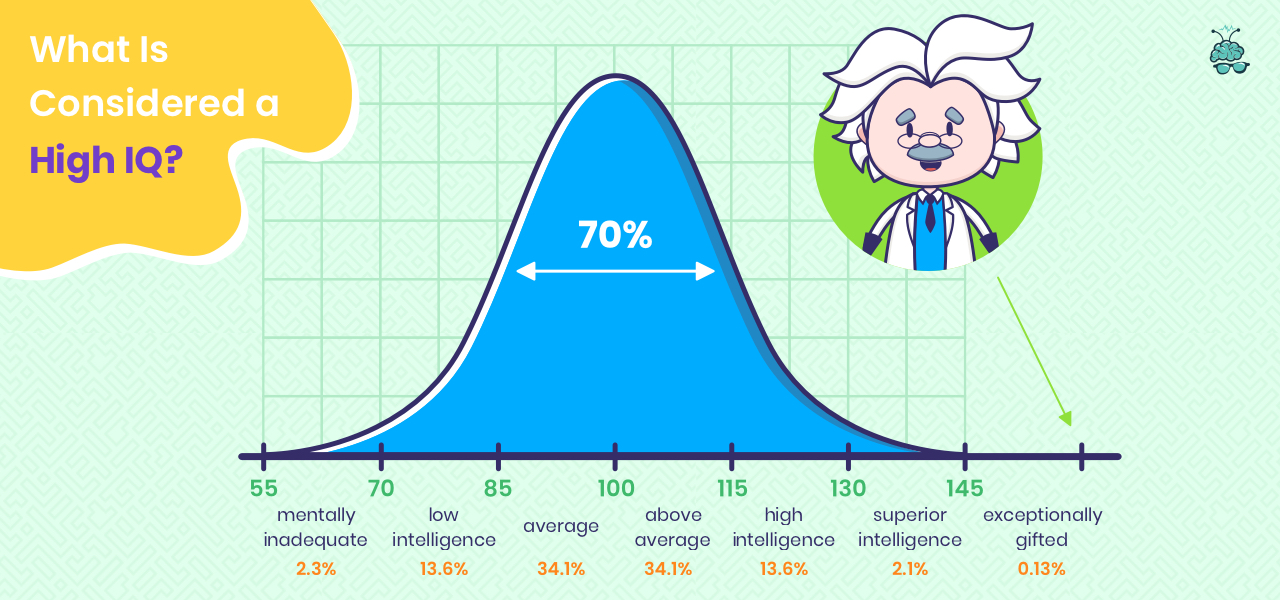What is a high IQ? This question has intrigued psychologists, educators, and the general public for decades. Intelligence Quotient (IQ) tests are commonly used to measure cognitive abilities, but what does a high IQ truly signify? In this article, we will delve into the definition of high IQ, explore its implications, and examine how it affects various aspects of life.
Understanding high IQ is not just about numbers; it's about recognizing the complexity of human intelligence. While a high IQ can open doors to educational and career opportunities, it can also bring unique challenges. This article aims to provide a comprehensive overview of high IQ, covering its definition, measurement, and the societal perceptions surrounding it.
As we navigate through this topic, we will also discuss the factors that contribute to intelligence, the limitations of IQ tests, and the importance of emotional and social intelligence. By the end of this article, you will gain a deeper understanding of what it means to have a high IQ and how it impacts individuals and society as a whole.
Table of Contents
- 1. Definition of High IQ
- 2. Measurement of IQ
- 3. Importance of High IQ
- 4. Factors Influencing IQ
- 5. Limitations of IQ Testing
- 6. Traits of High IQ Individuals
- 7. High IQ in Society
- 8. Conclusion
1. Definition of High IQ
IQ, or Intelligence Quotient, is a standardized score derived from a set of tests designed to measure human intelligence. A high IQ is typically considered to be a score of 130 or above, placing an individual in the top 2% of the population. However, the concept of intelligence is multifaceted and cannot be encapsulated solely by a numerical score.
1.1 Historical Context
The term "IQ" was first introduced by French psychologist Alfred Binet in the early 20th century. Binet's work aimed to identify students who required additional academic support. Since then, various IQ tests have been developed, each with its own methods and scoring systems.
2. Measurement of IQ
IQ tests aim to assess a range of cognitive abilities, including reasoning, problem-solving, and comprehension. The most common IQ tests include the Wechsler Adult Intelligence Scale (WAIS) and the Stanford-Binet Intelligence Scales.
2.1 Standardized Testing
These tests are standardized to ensure consistent measurement across different populations. Individuals take the test under controlled conditions, and their scores are compared to those of a representative sample. This process helps to establish norms and identify where an individual falls on the intelligence spectrum.
3. Importance of High IQ
A high IQ can have several advantages, particularly in academic and professional settings. Individuals with high IQs often excel in problem-solving tasks, critical thinking, and abstract reasoning.
- Academic Achievement: High IQ individuals tend to perform better in school and are more likely to pursue higher education.
- Career Opportunities: Many high-IQ individuals are drawn to intellectually demanding careers, such as science, technology, engineering, and mathematics (STEM).
- Social Perception: Society often associates high IQ with success, talent, and capability.
4. Factors Influencing IQ
While genetics play a significant role in determining IQ, environmental factors also contribute substantially. These factors include:
- Education: Access to quality education can enhance cognitive development.
- Socioeconomic Status: Children from higher socioeconomic backgrounds often have more opportunities for intellectual enrichment.
- Nutrition: A healthy diet during childhood is crucial for brain development.
5. Limitations of IQ Testing
Despite its widespread use, IQ testing has limitations. Critics argue that IQ tests may not accurately reflect an individual's true intelligence or potential.
5.1 Cultural Bias
Some IQ tests may be biased towards certain cultural or socio-economic groups, potentially disadvantaging test-takers from diverse backgrounds.
5.2 Narrow Focus
IQ tests primarily measure analytical and logical reasoning, neglecting other forms of intelligence such as emotional intelligence and creativity.
6. Traits of High IQ Individuals
Individuals with high IQs often exhibit certain characteristics that set them apart from their peers. These traits may include:
- Curiosity: A strong desire to learn and explore new ideas.
- Problem-Solving Skills: The ability to approach complex challenges with innovative solutions.
- Intellectual Independence: A tendency to think critically and form independent opinions.
7. High IQ in Society
The societal perception of high IQ can vary significantly. While some view high IQ individuals as exceptional, others may see them as socially awkward or disconnected.
7.1 The Gifted and Talented Programs
Many educational systems have programs designed to support gifted and talented students, recognizing the unique needs of those with high IQs.
7.2 Challenges Faced
Individuals with high IQs may face challenges such as social isolation, difficulty relating to peers, and pressure to perform at high levels.
8. Conclusion
In conclusion, a high IQ is more than just a number; it encompasses a range of cognitive abilities and potential. While high IQ individuals often excel academically and professionally, they may also encounter unique challenges in their personal lives. Understanding the nuances of high IQ can help foster a more inclusive perspective on intelligence, encouraging appreciation for diverse talents and abilities.
We invite you to share your thoughts on high IQ and its implications in the comments below. If you found this article informative, consider sharing it with others or exploring more articles on related topics.
Thank you for reading, and we hope to see you back on our site for more engaging discussions on intelligence and personal development!
:max_bytes(150000):strip_icc()/2795585-article-what-is-a-genius-iq-scoreecf71fe1-aadb-424b-b6ce-9a15002d2fdd-5a56782989eacc003758bb57.png)



